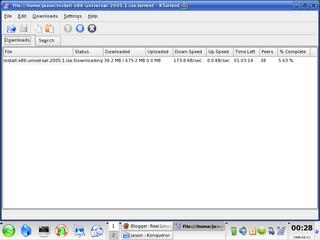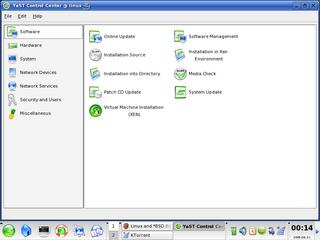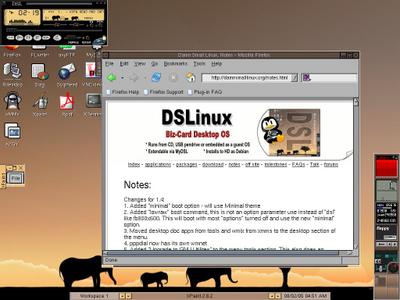OpenSUSE Linux 10.0 beta 2

Can't beat 'em might as well join 'em. Checking out the community version of SUSE called OpenSUSE. This is their second beta of version 10. The installer looks mostly the same except that they give you a choice of desktops (they did before too, but it wasn't obvious how to set this up). I picked KDE being most familar with it.
I was never given the opportunity to test my video configuration during the install which is a change from past releases. This is my second install. The previous install I chose to install the official nvidia drivers and X never came up and I couldn't reconfigure the settings as the text versions of yast and sax didn't work. So was forced to reinstall. Works fine this time.
 I'm glad to see they've added a BitTorrent client called KTorrent. One of my previous frustrations was finding a bittorrent client that was easy to install. At least it'll be easier for somebody else. KTorrent is plain looking but works.
I'm glad to see they've added a BitTorrent client called KTorrent. One of my previous frustrations was finding a bittorrent client that was easy to install. At least it'll be easier for somebody else. KTorrent is plain looking but works.YaST has smaller icons and I'm pretty sure that "Virtual Machine Installation (XEN)" icon is new. In the "Miscellaneous" option, there's also a new icon choice entitled "Post a Support Query" for collecting information about your system. This appears to be for official support so would probably only apply if you bought a retail box of SUSE.
 TaskJuggler is a new program to be included in a default install. Apparently it's a project management program.
TaskJuggler is a new program to be included in a default install. Apparently it's a project management program.So far I don't see anything that deserves a 9.x to 10.0 upgrade. However, their milestone schedule indicates two more betas before the first release candidate (RC1) so maybe there's things in the pipe yet.
Update: Just wanted to add that OpenLinux 10.0 beta 2 contains KDE 3.4.2b, a maintenance release of KDE. SUSE 9.3 Professional has 3.4.0b. To see the changes view this the 3.4 to 3.4.1 changelog and the 3.4.1 to 3.4.2 changelog.

